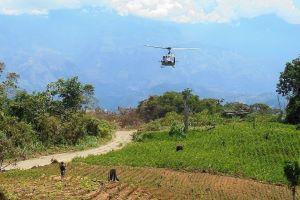This coming March, the United Nations will meet in Vienna to conduct a Midterm Review of the 2019 Ministerial Declaration on drugs -- the current, prohibitionist global strategy on drug policy. Between now and then, there will be a series of UN meetings and negotiations occurring to discuss the progress being made and to lay the groundwork for the next five years of global drug policy.

The global drug strategy is "off-track" in attempting to meet its various goals, ranging from curbing demand to addressing organized crime, violence, and insecurity to protecting the health and human rights of drug users to ensuring access to controlled substances for pain relief and palliative care, the report finds.
The report, Off track: Shadow report for the mid-term review of the 2019 Ministerial Declaration on drugs, details the abject global failure to achieve any of the core objectives of the current UN strategy -- the 2019 Ministerial Declaration on drugs. Instead, drug control efforts have resulted in devastating consequences for the security, health and human rights of millions, the report finds.
"We are at the halfway mark of the current 10-year global drug strategy, yet there has been no effort by governments to conduct a serious evaluation. When governments convene at the UN in March 2024, they are likely to once again rubber stamp a continuation of the catastrophic 'war on drugs' that nobody believes will succeed," said Ann Fordham, Executive Director of IDPC. "Our report steps into the vacuum and brings the evidence to bear on the UN drugs debate. Governments cannot continue to shy away from decades of failure and must urgently correct course. Their continued dereliction of duty will be bitterly borne by communities worldwide."
Using wide-ranging data from UN, government, academic and civil society sources, the report represents the only comprehensive evaluation of global drug policy and illustrates its system-wide collapse. According to the IDPC report:
- Despite billions spent every year to curb drug markets and availability, the number of people who use drugs increased from 271 to 296 million in four years, reaching a historic record.
- The latest global estimates on drug use-related deaths reached 494,000 in 2019 alone (the latest global data available), with a surge in overdose deaths.
- The number of people executed for drug offenses, in flagrant violation of international law, rose by 213 percent between 2019 and 2022.
- Fueled by punitive drug laws, the number of people incarcerated worldwide rose from 10.74 million to 11.5 million between 2018 and 2023 -- with more than 2 million imprisoned for drug offenses.
- Globally, only one in five people with drug dependence have access to treatment.
- The shocking disparity in access to controlled medicines continues, with over 82 percent of the global population having access to less than 17 percent of the world's morphine.
The report notes that while all this is going on, the consensus around global drug prohibition is "fracturing." Since the Ministerial Declaration was authored five years ago, the number of people who can legally use internationally controlled drugs for non-medical use has more than doubled and is now closing in on 300 million.
Marijuana is now legal in Canada, Jamaica, Luxemburg, Malta, Thailand, and Uruguay, as well as 24 American states, three US territories, and Washington, DC. Mexico and South Africa are under court mandates to join this group, and Germany is just a few legislative steps away. Bolivia has established a regulated market for coca. And this year, the UN Office of the High Commissioner for Human Rights became the first UN entity to call for legal regulation to protect the health and security of communities.
"Throughout my career as a lawyer, judge, and minister, I have seen first-hand how drug laws have driven violence and mass incarceration, especially for women, racial and ethnic minorities, and people living in poverty," said Diego García Sayán, former Minister of Justice and Minister of Foreign Affairs of Peru. "This report should lay the ground for a process of deep reform that sheds the global punitive paradigm and protects the health, welfare, and human rights of people everywhere."
It is certainly something for the global drug bureaucracy and the national delegations to chew on between now and March.
Add new comment